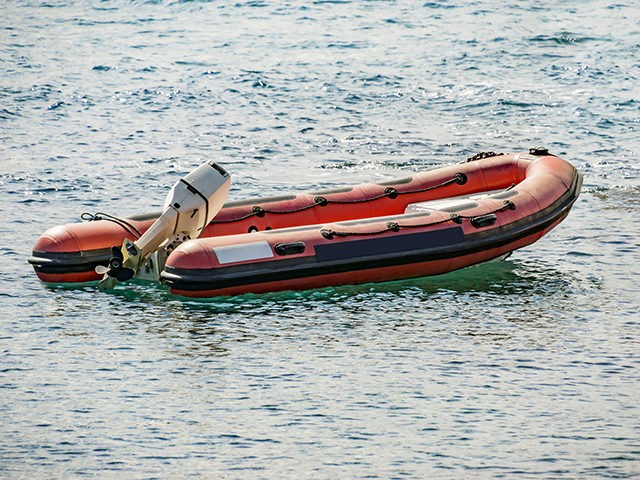Two Chinese men have arrived in Taiwan in the past week, the latest on Wednesday, using small dinghies purchased online and reportedly attempting to escape communism.
The back-to-back cases of communist refugee balseros — the Spanish-language term popularized by Cuban refugees in the 1990s — is an embarrassment for China, which falsely claimed to eradicate poverty this year and invests heavily in state media claiming its citizens live happily under communist totalitarianism. Chinese officials are already facing controversy over the criminal prosecution of a group of Hong Kong citizens who attempted a similar flight from the formerly autonomous city in the aftermath of Beijing illegally imposing a “national security” law on Hong Kong that prescribes a minimum ten-year prison sentence on dissidents for crimes such as “subversion of state power.”
Hong Kong’s Apple Daily — an anti-communist newspaper founded by a refugee who fled China by smuggling himself into a fishing boat — identified the latest arrival in Taiwan as a man named “Jiang” (spelled in other reports “Chiang”) who reportedly said he made the perilous maritime trip out of Fujian province seeing “freedom and equality” in sovereign, democratic Taiwan.
“Surnamed Jiang, the man rowed for five hours, before he was detected by radar and intercepted by Taiwan coastguards. He also claimed that he made the dangerous trip in pursuit of democracy and freedom in the self-governed island,” Apple Daily reported.
The man reportedly arrived in Taiwanese waters outside the Kinmen Islands, about a mile from the nearest Chinese territory, when Taiwanese authorities spied his makeshift boat and immediately apprehended him. Taipei is currently investigating the man to confirm his claim that he is a genuine refugee of the communist dictatorship and isolating him to ensure that he does not test positive for Chinese coronavirus and, if so, that he does not infect others. Taiwan News noted that the man brought pork dumplings with him on the voyage that were “immediately destroyed” given the outbreak of Asian swine flu in China at the moment.
Taiwan News offered other details on Jiang’s journey, including his claim that he is originally from Guangxi province, at least 500 miles away, and in his 20s. Jiang reportedly claimed he bought his raft online and that he “wanted to come” to the country. The outlet noted he will face criminal prosecution for violating immigration laws and will be undergoing quarantine to prevent the spread of Chinese coronavirus.
Taiwan has conducted arguably the most successful campaign against the Chinese coronavirus pandemic in the world, largely a testament to Taipei’s distrust of the Communist Party of China. Taiwanese officials warned the World Health Organization (W.H.O.) in December that it had evidence of the spread of an unknown, contagious respiratory disease in China. The W.H.O. disregarded the warning and still claimed the Chinese pathogen was not transmissible from human to human nearly a month later. Much of the world heeded the W.H.O. while Taiwan treated coronavirus infection as a contagious disease.
Despite its proximity to China and its population density, Taiwan has only documented 1,173 cases of Chinese coronavirus since the pandemic began and 12 deaths.
Jiang joins a second man, Zhou, who arrived on April 30. Zhou took the much longer journey between Shishi City, Fujian, and Taiwan’s Taichung Harbor, across the entire 200-mile Taiwan Strait. Zhou, alleged to be in his 30s, reportedly told authorities a similar story as Jiang — that he “yearned” for freedom from communism and that he bought his inflatable raft online. Zhou’s dinghy reportedly featured a motor.
The two men may have chosen similar times for their departures due to the recently concluded May Day holiday. May Day, or International Workers’ Day, is a Marxist holiday to celebrate the deadly legacy of communism. In China, the celebration lasts five days, from May 1-5. Chinese authorities actively encouraged travel during this holiday despite concerns of low coronavirus vaccination rates, which may have made travel by the men to Fujian with rafts less suspicious when crossing provincial lines.
The rafter phenomenon rose to prominence recently for China after the arrest of 12 Hong Kong residents attempting to reach Taiwan, a 400-mile journey, in August. The Chinese Coast Guard arrested them 26 miles away from Hong Kong’s shores. The Communist Party’s legal system sentenced ten of the 12 to up to three years in prison for attempting to flee the dictatorship in December. The remaining two were released into Hong Kong as they were minors at the time of their apprehension.
Refugees fleeing by boat, raft, or other unreliable vessel have become a staple of communist dictatorships. Some studies have estimated that as many as 150,000 Cuban people have died trying to flee the island by boat, including some intentionally drowned by Cuban Communist Party authorities. In recent years, the phenomenon of Venezuelan rafters, many attempting to reach free Caribbean nations like Trinidad and Tobago, has developed in light of two decades of socialist catastrophe in the once prosperous oil-producing nation.

COMMENTS
Please let us know if you're having issues with commenting.